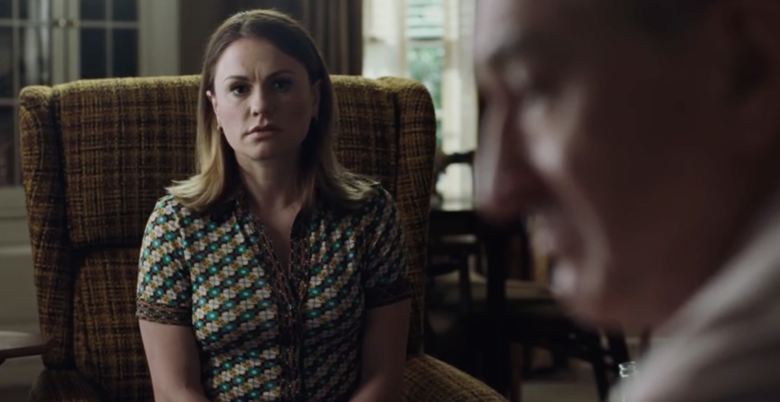I’d long wondered what Martin Scorsese’s fascination with Italian-American gangsters was. Why had he dedicated so much of his career to telling the mostly true stories of some of the most violent, corrupt, heinous people in American history? I’ve long admired Scorsese’s skill and ability to finesse a caustic examination of these titans of violence. He draws you in, managing to entice the viewer into the world, presenting it like a grand opportunity for success. Then he masterfully shows the impact of the downfall, presenting the outcome in all its brutality. Nobody wins in this world.
But, after sitting through Goodfellas, Casino, Gangs of New York, and tangentially, The Wolf of Wall Street, I still wondered, why return to this well so frequently? What benefit is there to exploring the same ground over and over? After all, isn’t there a point where the filmmaker becomes complicit in amplifying this kind of criminality? While Scorsese’s work has not strayed across to the wrong side of the tracks in pop culture, where the characters he’s criticising have become their own mythological heroes ala Tony Montana in Scarface, it’s questionable whether the impact of how terrible these people are truly lands with every viewer.
If I’m being completely honest, the gangster ‘genre’ is not one that I enjoy watching. I can see that these are well made films, brilliantly crafted and superbly acted, but I find myself rejecting their characters completely to the point of disgust. Yes, Goodfellas is an impressive film that submerges you in Henry Hill’s world, forcing you to watch each air bubble float up to the surface as you struggle to hold your breath and stay alive. But, no matter the technical prowess on display, I can’t help but finish each film with the feeling that I never want to go through that again. I’m sure that’s sacrilege, but honesty is honesty and not everything works for everybody.
All of this ran through my mind as I sat down for another spin of the old gangster wheel with his long in development ageing gangster film, The Irishman. Hand on my heart, I can’t say I was eagerly anticipating sitting down with despicable men for three and a half hours.
But, at the end of its exhaustive runtime, I found myself deeply moved and now fully understanding just why Martin Scorsese would dedicate so much of his life to telling these stories.
First of all, that runtime, it’s there to make you feel every second of its 209 minutes. How else do you convey the feeling of getting old? Of ageing and sitting with a life of violence and emotions? Well, you force the audience to do exactly that. To sit with the characters actions and supply them with moments of tedium where the feeling of years passing by washes over you. The Irishman is never boring, and never tiring, instead, Scorsese manages to make being a gangster feel momentarily mundane. He leaves you feeling like the glamorous life of crims and crooks is all for show.
In this way, The Irishman is a curious companion film to Dragged Across Concrete. Both are brutally violent films, but both examine their subjects through extended moments of quiet. There’s a deliberate ode to patience employed in both films, and to have that come across as engaging and interesting rather than tiring and tedious is astounding.
The Irishman feels like the culmination of everything that Scorsese has been working up to. It feels like the full stop to a long paragraph about the history of gangsters in America.
For me, something has finally become clear that no doubt was clear to everybody already: Martin Scorsese does not like these people at all.
He tells their stories as a way of exploring his own culture and history. He is an Italian-American, and no doubt grew up walking the same paths as many of the people his gangster films explore. Scorsese grew up in Little Italy, a familiar beat of Manhattan that many of these criminals called home. I’m not suggesting that if circumstances were different for Scorsese that he would have been a gangster himself, but more that as a way of exploring his own history, of reckoning with the traumas that some of the most infamous Italian-Americans inflicted on others, he has crafted a series of films that explore this history in depth. In that way, Scorsese is working to exorcise the demons of the past, to lay out what went wrong and to provide an atonement of sorts for their actions. This is less an apology, and more a mea culpa for his cultures actions.
It would be akin to me writing a piece taking account for the actions of white Australians in the past. No, I personally didn’t enact genocide against the First Nations people of Australia, but I’ve certainly been part of a heritage that has. I have sorrow and guilt over that, and due to that would like to enact some kind of reparation for my cultures historical actions. I see Scorsese’s gangster films in that same light. ‘Here are the errors of the past, let us not continue them going forward.’
Again, this may have been blatantly obvious to everyone else, but for me, it feels like a major lightbulb moment. Martin Scorsese doesn’t hate these people. It’s clear that he empathises with them completely, understanding how circumstance and desire may thrust men into the life of criminality. But, as shown in The Irishman through searing dual performances from Lucy Gallina and Anna Paquin as lead character Frank Sheeran’s (Robert De Niro) daughter, Peggy, Scorsese has been watching all along, observing with a critical eye, and through his prolonged judgement, he works to distance Italian-Americans from the weight of the stereotypical ‘gangster’.
The Irishman presents the aged mobster as a solitary figure, along in society, devoid of everything that made them who they were. Their families and their friends have either abandoned them or died, and as such, they find themselves without a culture to call home. It’s quietly depressing how lonely and soul destroying a life of violence can be, and Martin Scorsese ensures that we are going to witness and understand every moment of it. At its conclusion, Scorsese leaves us looking back at the height of the gangsters of America and suggests that we are now – finally – done with these stories. The book feels closed, and for me, it feels like Scorsese has finally reconciled with the actions of his ancestors and fellow Italian-Americans.
The Irishman is a brilliant film, measured and wise, quiet and considered. And, for the first time, I don’t feel like I never want to sit with these characters ever again.
Director: Martin Scorsese
Cast: Robert De Niro, Al Pacino, Joe Pesci
Writer: Steve Zaillian, (based on the book I Heard You Paint Houses by Charles Brandt)




